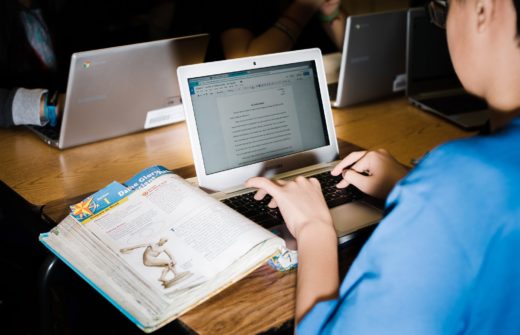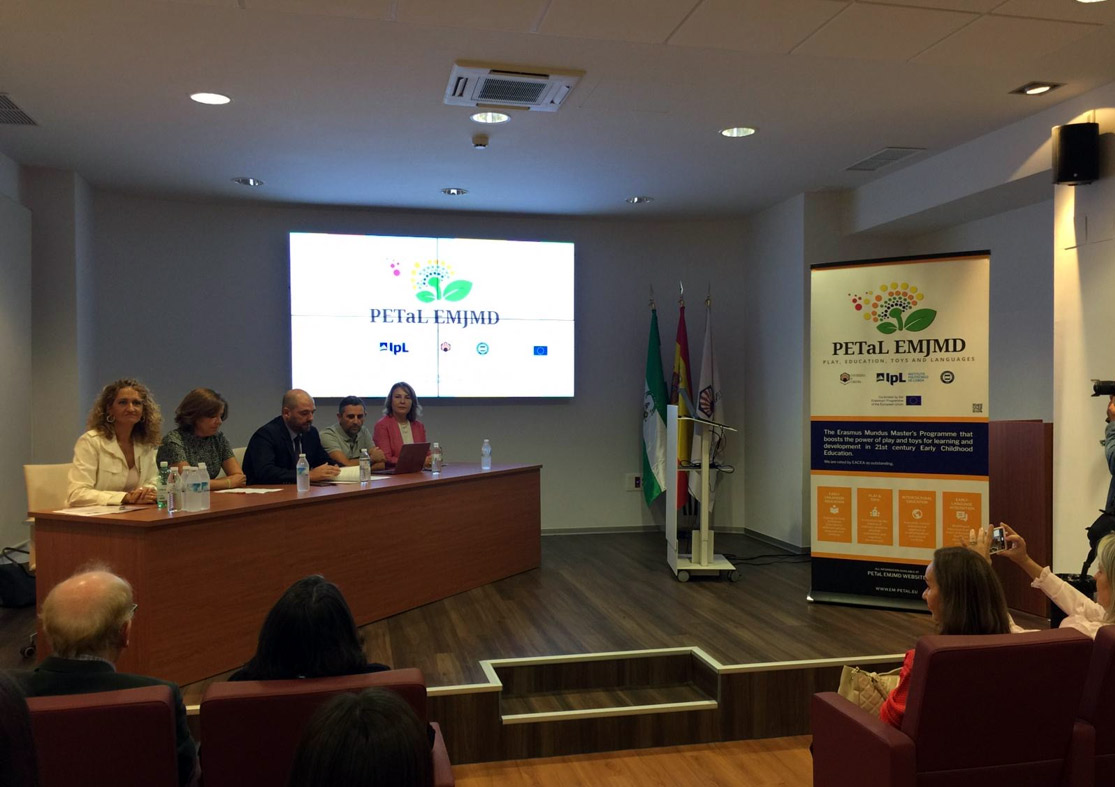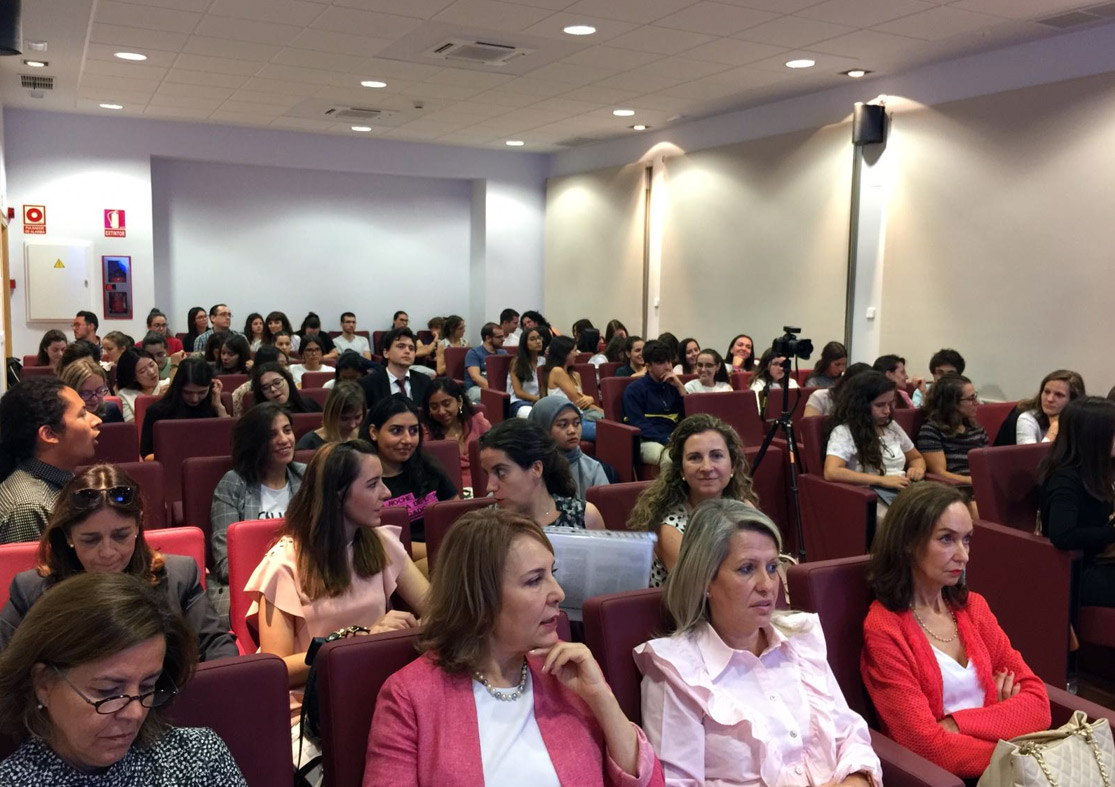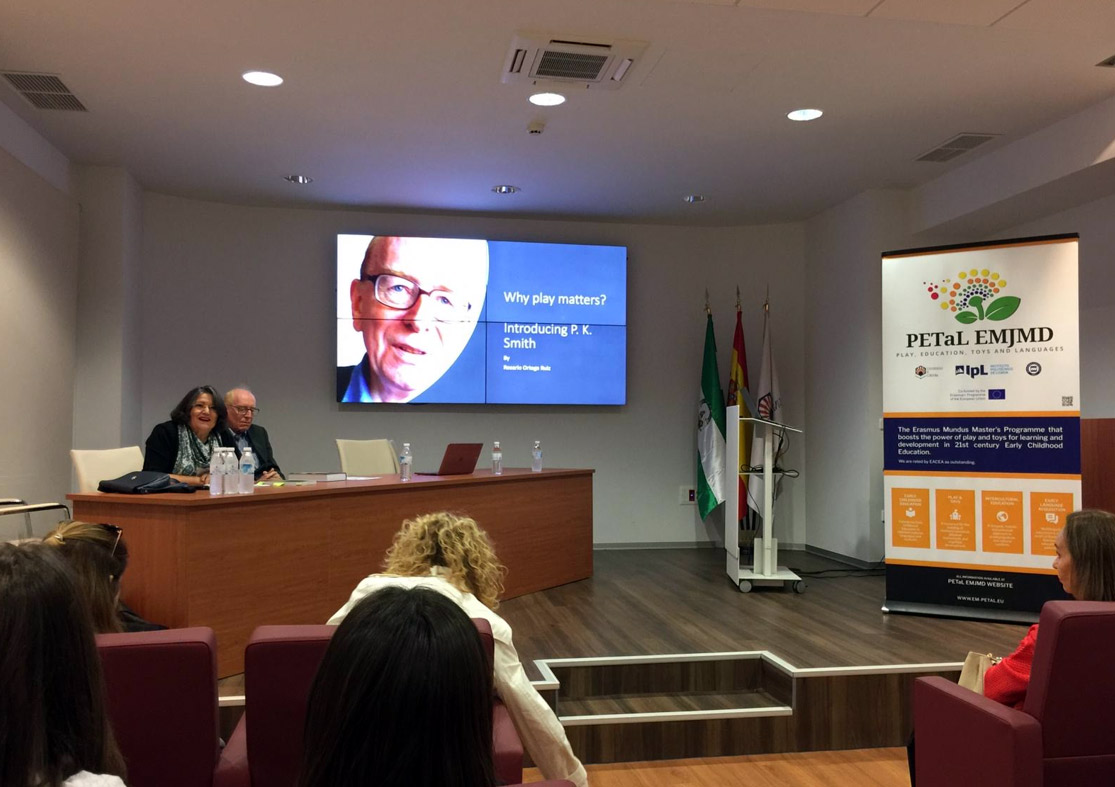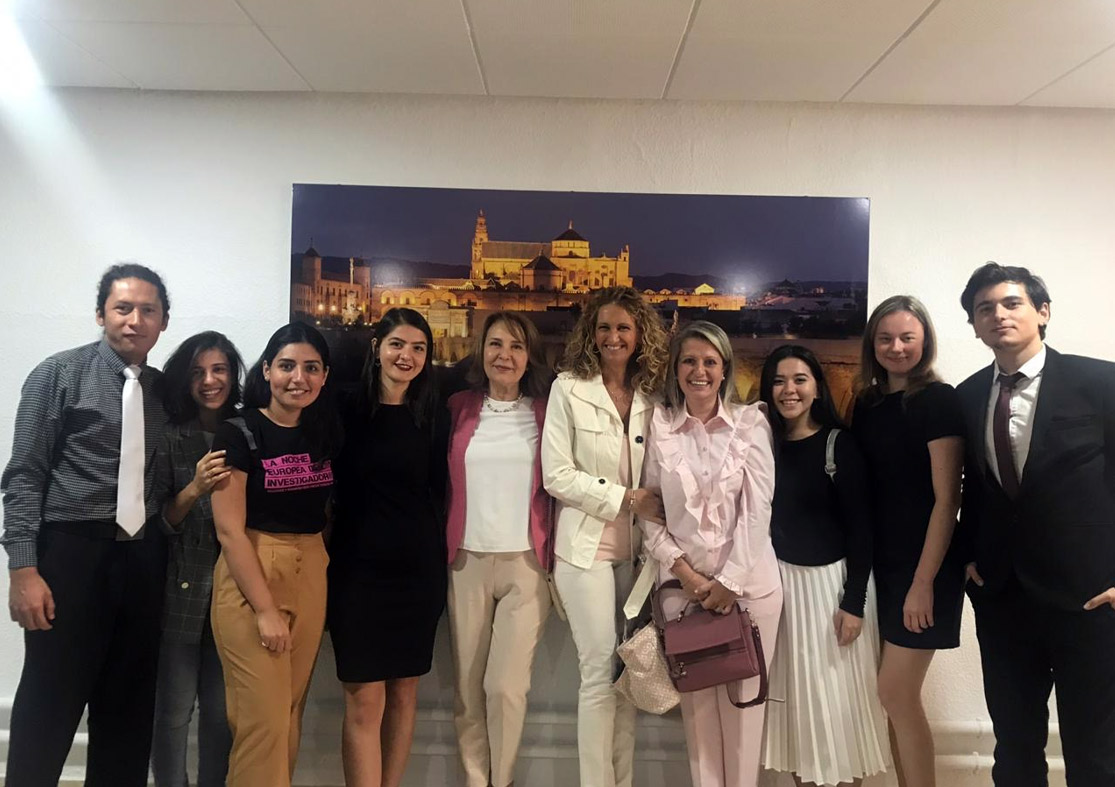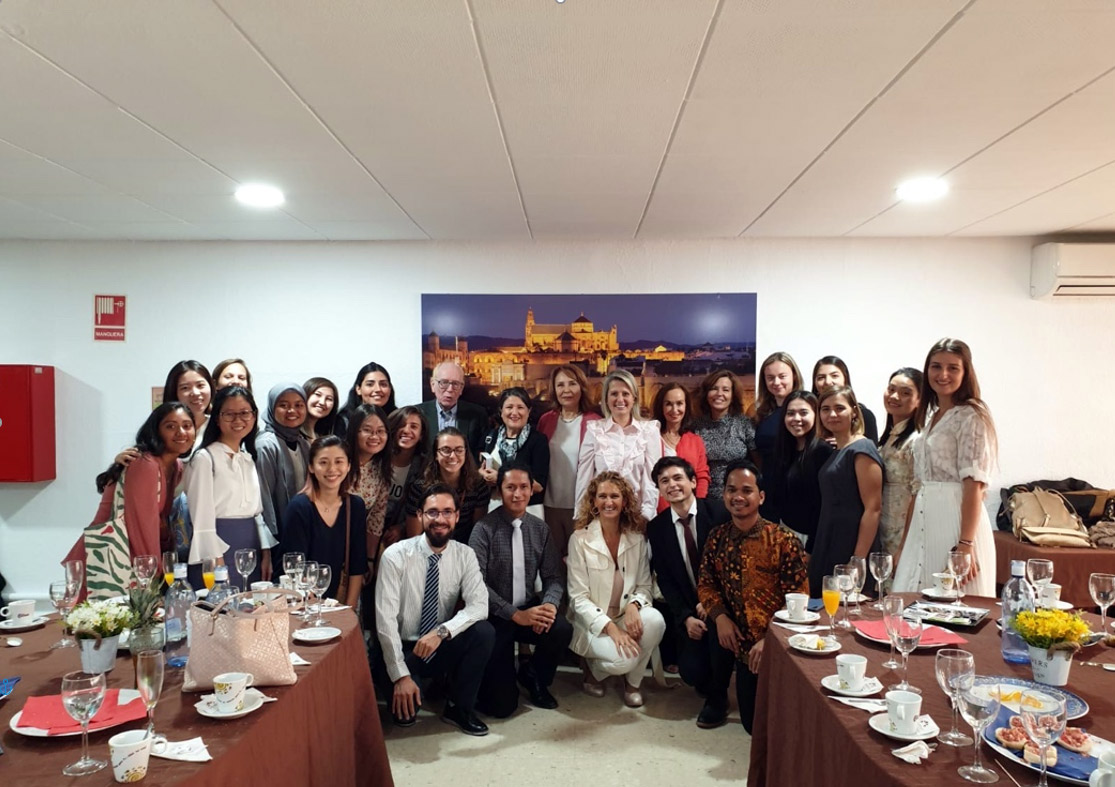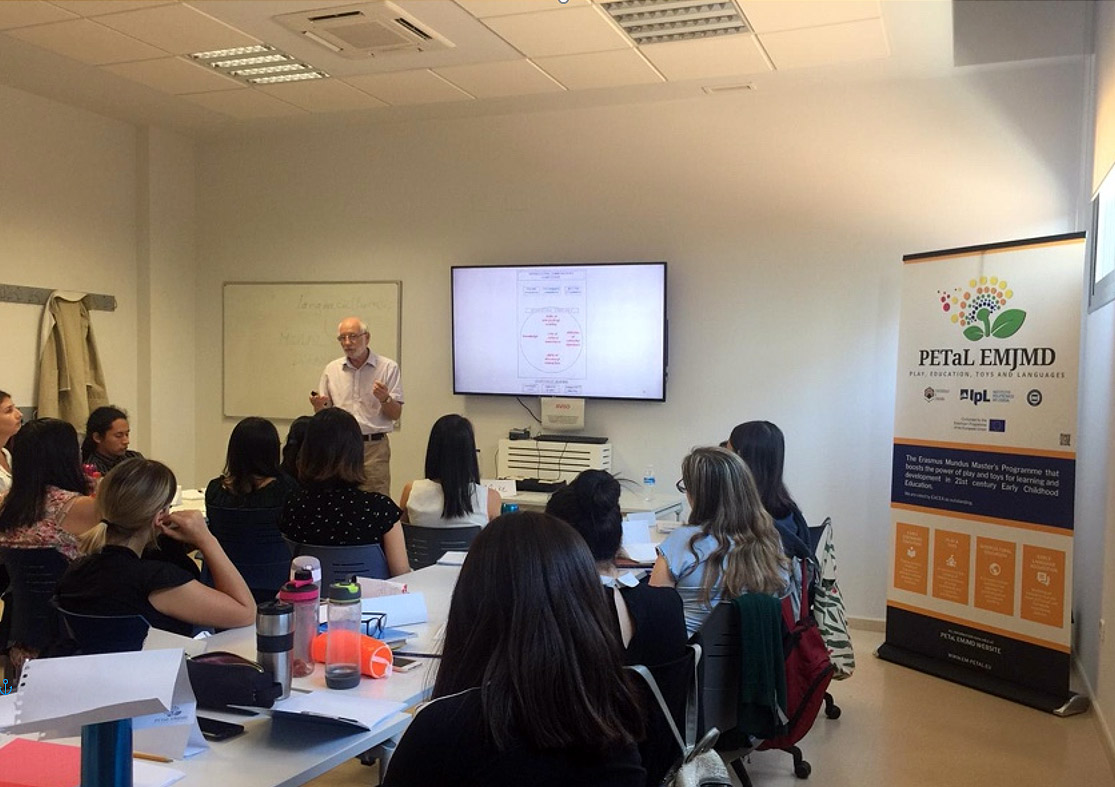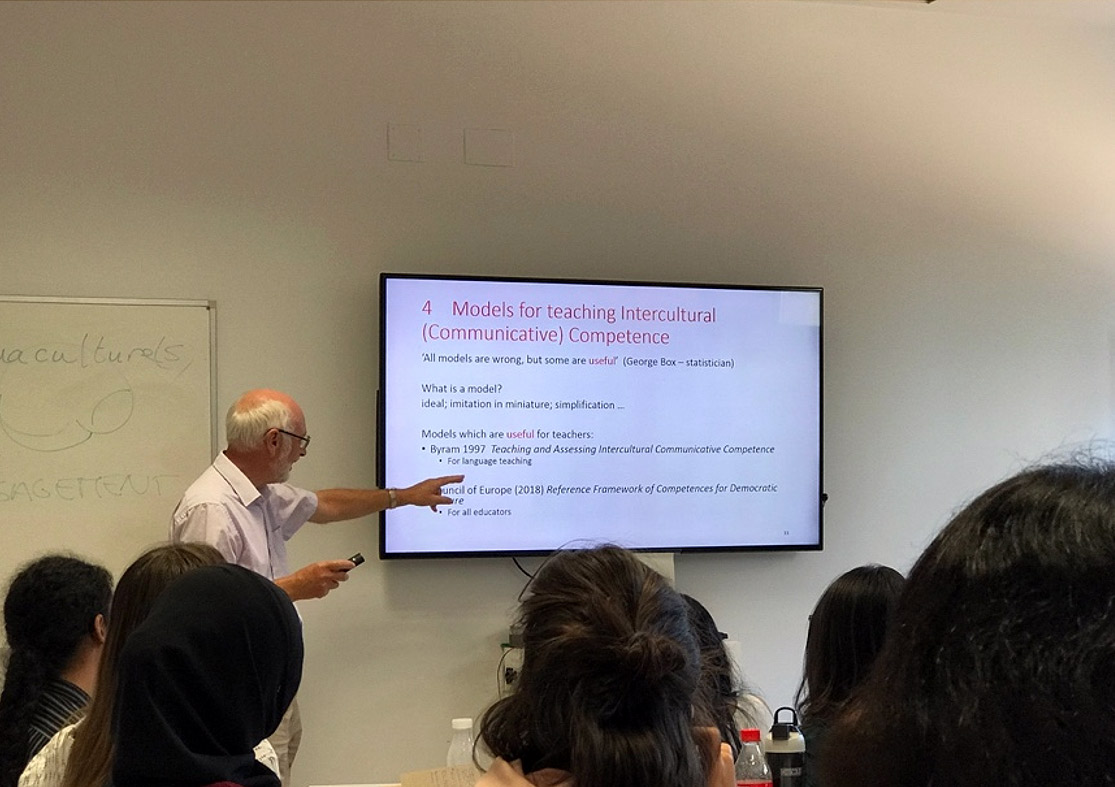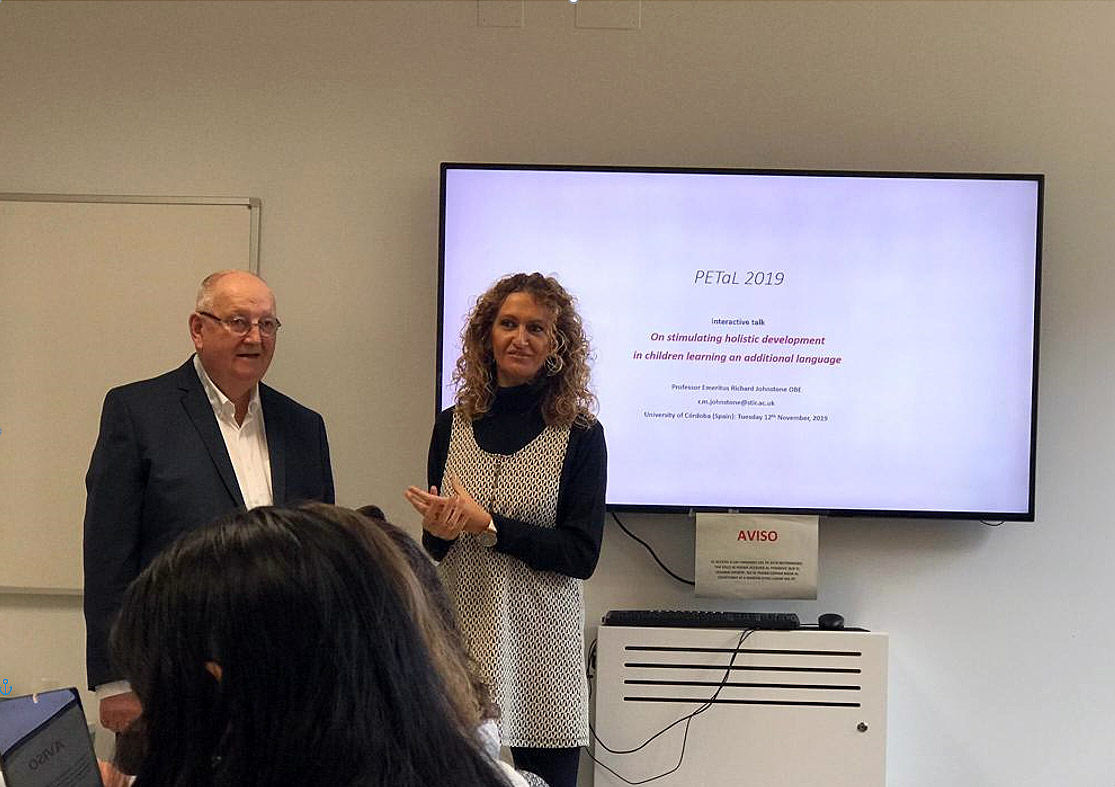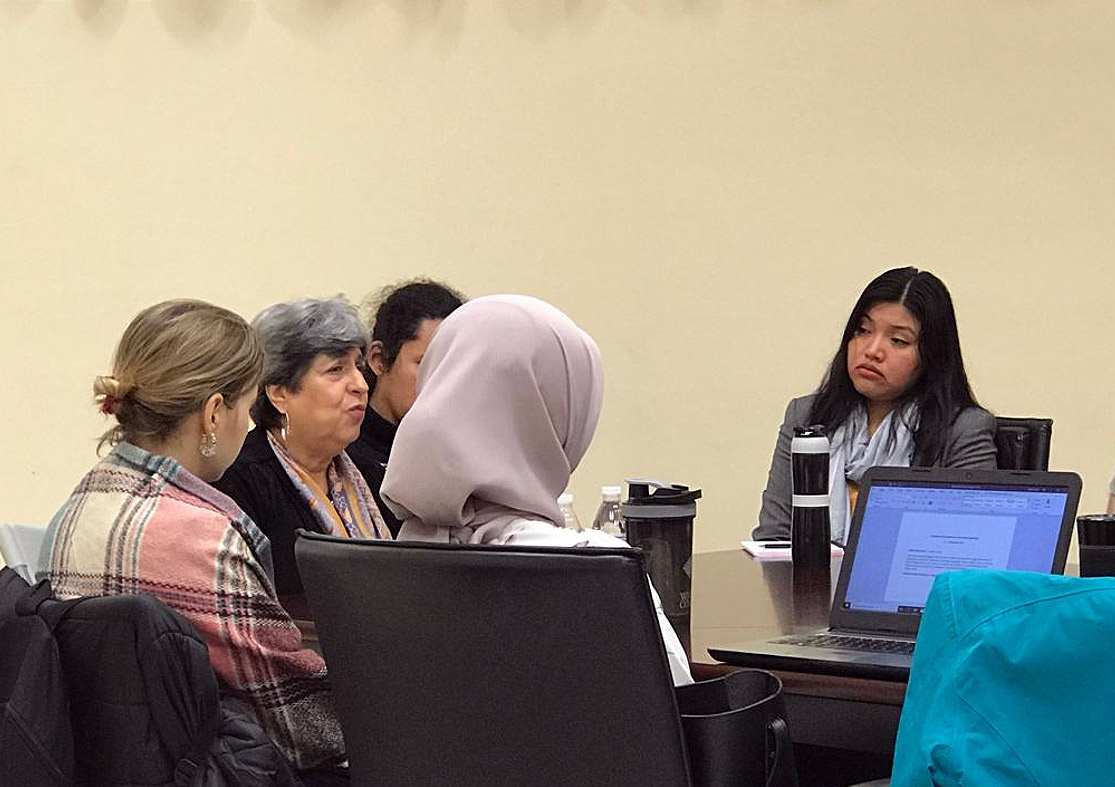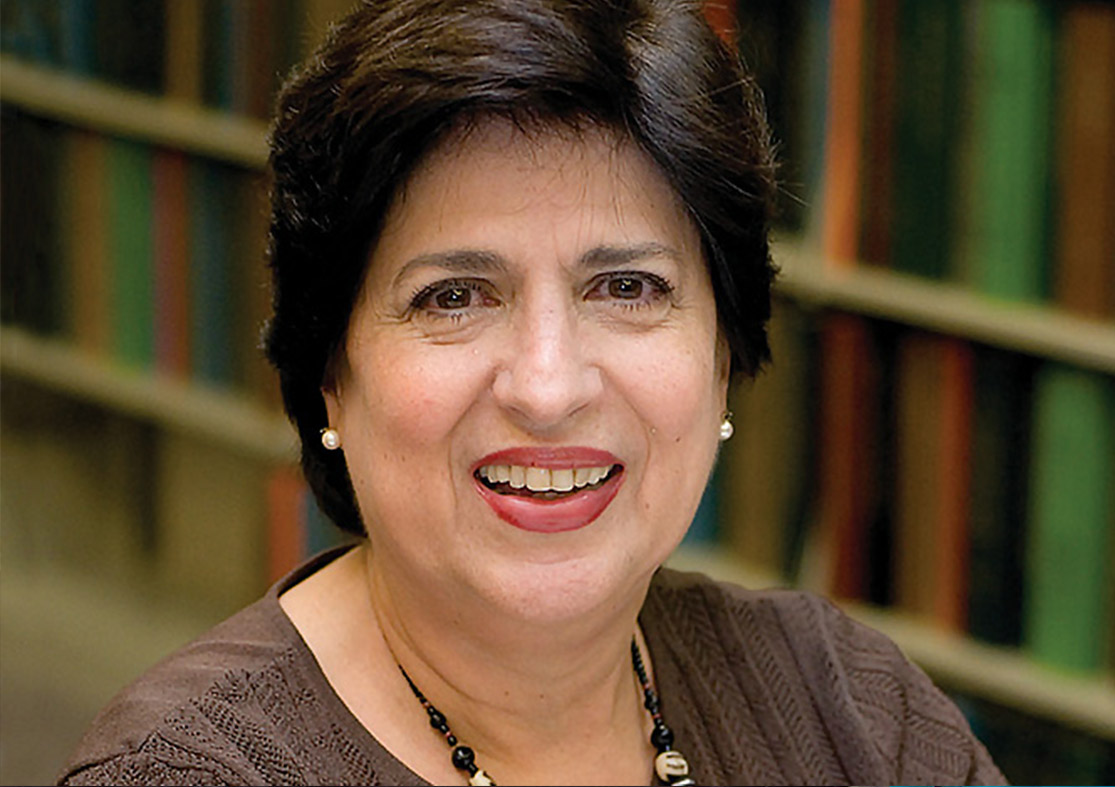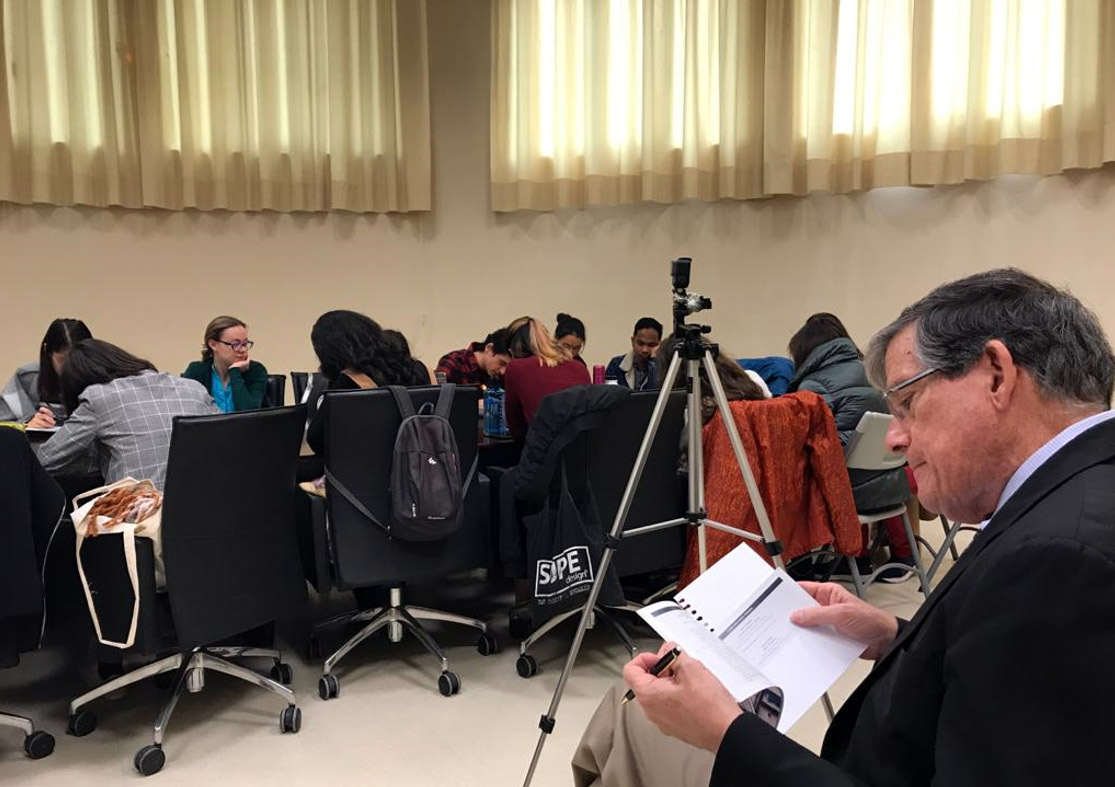Academic Activities
PETaL EMJMD programme organizes a large number of academic activities throughout each cohort. The following are some of the most outstanding activities of the 2019-2020 academic year.
PETaL’s official opening ceremony
Date: 7th October 2019
The opening ceremony of the PETaL Master’s Programme took place on the 7th October 2019 in the Faculty of Medicine and Nursing. This event was attended by the first cohort of PETaL students, undergraduate students of Education Studies and representatives of the participating institutions: Mr. Enrique Quesada Moraga, Vice-rector of Research and Territorial Development of the University of Córdoba (UCO); Mr. Luis Jiménez Reina, Dean of the Faculty of Medicine and Nursing of the UCO; Ms. Ana Cristina Miranda Perdigão, Vice-president of the Lisbon Polytechnic Institute (IPL); Ms. Ozana Ural, Director of the Department of Infant Education of the Faculty of Education at Marmara University (Turkey), and Ms. Mª Elena Gómez Parra, Director of the Erasmus Mundus PETaL Master’s Degree. Ana Cristina Miranda Perdigão, Vice-president of the Lisbon Polytechnic Institute, assured that this Master will strengthen “links between institutions” and continue to strengthen the Portuguese academic institution, “which has been able to adapt successfully to the challenges presented by education”. The Director of the Department of Early Childhood Education of the Marmara University Faculty of Education, Ozana Ural, highlighted the multicultural factor that this Master’s will represent and from which the three participating universities will be able to enrich themselves.
Visiting Scholar: Prof. Peter Smith
Event: PETaL’s official opening ceremony
Date: 7th October 2019
The PETaL students attended a conference delivered by Professor Peter Smith. He is an Emeritus Professor at Goldsmiths, University of London, continuing with research, writing, and international collaborations. He is a Fellow of the British Psychological Society, the Association of Psychological Sciences, and the Academy of Social Sciences. In 2015 he was awarded the William Thierry Preyer award for Excellence in Research on Human Development, by the European Society for Developmental Psychology, and in 2018 the Student Wellbeing and Prevention of Violence (SWAPv) Award, from Flinders University, Australia. In December 2018 he received an Honorary Doctorate from the University of Vienna.
His contribution during the opening ceremony of the PETaL Master’s Degree was undoubtedly highly valuable, enriching and informative for our international students as Mr. Smith is an expert in the areas covered in the PETaL programme: he is currently particularly interested in country differences and cross-cultural comparisons and he has also carried out research on children’s play; and on the role of grandparents in children’s development
Visit of the Lisbon and Istanbul partners to Córdoba (Spain)
Dates: 7th- 8th October 2019
The PETaL partners all met at the UCO on the 7th and 8th October 2019 as they were invited to the opening ceremony —together with their institutional representatives—. The three Consortium partners also took part in several working sessions with the group of twenty-four students to meet them personally and have the opportunity to deal with all the students’ queries and concerns regarding their next semesters in Lisbon and Istanbul.
Visiting Scholar: Prof. Michael Byram
Course: Intercultural Education
Dates: 24th - 25th September 2019
The students attended the Plenary and the workshop delivered by Professor Michael Byram from the University of Durham (UK) on the 24th and 25th September 2019 at the UCO. His Plenary was entitled ‛Intercultural (Communicative) Competence and Young Children’ and the students were delighted to learn from his approach both theoretical and practical to work on the main issues concerning Intercultural Competence and children at early ages. Professor Byram’s research interests relate to intercultural education, comparative education and foreign language teaching. He has also published many books and articles including: Teaching and Assessing Intercultural Communicative Competence; From Foreign Language Education to Education for Intercultural Citizenship, The Common European Framework of Reference.
Visiting Scholar: Prof. Richard Johnstone
Plenary: On stimulating holistic development in children learning an additional language
Date: 12th November 2019
Professor Emeritus Richard Johnstone was for many years employed at the University of Stirling (Scotland) as Professor and Head of the Department (later, the Institute) of Education and was also Director of the Scottish-government-funded Scottish Centre for Information in Language Teaching & Research. His main specialisms are: ‘the early learning of additional languages’, ‘immersion, bilingual education and CLIL’, and ‘international, national and local policies for the learning and use of additional languages’. By the term ‘additional languages’ are intended not only so-called ‘foreign languages’ but also global languages (especially English), ‘community languages’ such as Chinese in Scotland, and ‘heritage languages’ such as Gaelic in Scotland and Ireland, and Breton in France. He has directed research projects on aspects of these themes not only in Scotland but also in a range of countries in Europe and East Asia. He is the author of several publications, including each year from 1991 to 2009 the annual review of international research on languages teaching, learning and policies published by Language Teaching (CUP), and more recently with Dr. Elena Gómez-Parra has co-edited two publications on BE&CLIL that include contributions from a large number of researchers in Spain. He has been a plenary speaker at international conferences in a wide range of countries, particularly in Europe and Asia. His main languages are English, Scots, German and French. Other ‘languages’ of which he is a keen learner are Chinese (Mandarin and Cantonese) and the language of the classical guitar, especially the more accessible (to learners) compositions of the great Fernando Sor and Francesco Tarrega.
As a renowned specialist on Early Childhood Education and Bilingual Education, the plenary of Prof. Johnstone was highly appreciated by PETaL students. Prof. Johnstone set the main opportunities and advantages of Early Second Language Acquisition (ESLA), so that students could understand the main difficulties that teachers can find in this area. The nearness and friendliness of Prof. Johnstone was another positive point of his plenary, which all students remarked after his plenary.
Visiting Scholar: Prof. Ofelia García
Plenary: Translanguaging and Early Childhood Education
Date: 13th November 2019
Ofelia Garcia is Professor Emeritus at the Graduate Center of the City University of New York. She was previously a professor at Columbia University and Dean of Education at Long Island University. Her publications on the sociology of language, language policy, bilingualism, and bilingual education are extensive, and are motivated by her bilingual life in New York after leaving Cuba at age 11. Among his best known books are Bilingual Education in the 21st Century: A global perspective; and Translanguaging: Language, Bilingualism and Education (with Li Wei) which received the British Association of Applied Linguistics award in 2015. She has been editor of Spanish in Context, Language Policy and The International Journal of the Sociology of Language. In 2017 García received the Charles Ferguson Award in Applied Linguistics and the AERA Lifetime Career Award in Bilingual Education. She has been named a Fellow of the National Academy of Education in the United States.
Prof. García workshop was one of the best valued of PETaL students during the first semester. The theories and policies on bilingualism and the pedagogies used are still the same today as those drawn up in the 20th century. In other words, they have not been transformed to accommodate the greater recognition of linguistic diversity and the fluidity of these practices that make up communicative action in the 21st century. Her presentation proposed that we open paths for the linguistic practices of students in our socio-educational context today, instead of following educational policies and pedagogical practices that come from outside and before. We propose that in order to open bilingual paths we must let the current of translationalism flow. This current, created by the performativity and interaction of students and educators in a local context, recognizes that the bilingual student acquires through interaction, new features both linguistic and other multimodalities that are incorporated into their unique repertoire. In other words, it is not simply a matter of acquiring an autonomous and separate second language, but of incorporating new features and actions into the semiotic repertoire with which the bilingual performs the process of what the Chilean biologist Francisco Varela called his “languaging” (1984). Finally, Prof. García gave examples of how the theory of trans-language, which has been developed since its beginnings in Wales, impacts bilingual pedagogical practices, transforming the interactions in the classroom of both majority and minority students. She focused on how translational learning transforms the student’s relationship with his or her world and word (Freire, 1970), especially with the written word and their identity as bilingual readers and writers. She emphasized how, by opening the way to more equitable and inclusive bilingual educational practices, translanguaging practices have transformative potential, disrupting the social structures that prevent minority and disabled students from entering bilingual education.
Visiting Scholar: Prof. Ricardo Otheguy
Plenary: Bilinguals and Translanguaging
Date: 14th November 2019
Ricardo Otheguy is Prof. Emeritus of Linguistics at the Graduate Center of the City University of New York (CUNY). His theoretical publications have dealt with variationist sociolinguistics and the Columbia School and semiotic-functional grammar, and with bilingualism and Spanish in the USA. His publications in the area of applied linguistics have dealt with issues related to bilingual education and the teaching of Spanish to Spanish speakers in the USA. Otheguy is the author of more than fifty articles and reviews, published in major anthologies and magazines, among them: Language, Language & Society, Modern Language Journal, Harvard Education Review, Applied Linguistics Review, The Bilingual Review, Hispanic Linguistics, International Journal of the Sociology of Language. He has published, with Ana Celia Zentella Spanish in New York: Language contact, dialectal leveling and structural continuity (Oxford University Press) and has been a co-editor, with several collaborators, of anthologies such as Language Across Cultures/Cultures Across English: A reader in cross cultural communication; Signal, Meaning, and Message: Perspectives on sign-based linguistics; and Columbia School Linguistics in the 21st Century. He co-founded the journal Spanish in Context. On two occasions, Otheguy has been a Fulbright Scholar at the Universidad de la República in Montevideo. He has taught and lectured at Latin American and Spanish universities and centers in Havana, La Plata, Lima, Mexico, Montevideo, Salamanca and San Juan, as well as at study centers in Germany, France and Sweden. Several of his investigations have been supported by the National Science Foundation and the Rockefeller Brothers Fund. Otheguy is founder and co-director of the RISLUS Institute (Research Institute for the Study of Language in Urban Society), which aims to apply CUNY’s intellectual resources to the real and intellectual problems that arise at the nexus of language and the urban environment in New York and other cities. In addition to his work as a teacher and researcher, Otheguy has supported the development of bilingual schools in New York City, and has supervised bilingual teacher practices and doctoral theses on dual language education programs in New York. Otheguy has developed materials for teaching Spanish to Spanish-speaking children in the U.S., and is co-author of Tu Mundo: Curso para Hispanohablantes, and the Placement Test for Spanish Speakers. He has also prepared school materials for English-speaking children, and co-authored the most widely used book in the US for teaching Spanish to English speakers in secondary schools. Otheguy received his PhD in linguistics from the CUNY Graduate Center in 1976. He also holds B.A. and M.A. degrees from Louisiana State University and City College of New York, and a diploma in Hispanic Studies from Universidad Complutense de Madrid.
Prof. Otheguy’s workshop was focused on the sociolinguistic area of ECE. The 40 million Spanish speakers in the United States, half are native bilingual, whom sociologists call ‘second’ generation. We study the language of these bilingual speakers, adopting the translingual perspective of unitary lexical-structural repertoire. We emphasize the importance for studies of bilingualism of focusing on speakers, not languages. We expose the background ideas to the concept of translanguaging. We recall that the referents of the so-called languages are socio-cultural entities, not linguistic in the systemic sense of the term. We explore the theory of general equivalence with nuances in order to try to understand the linguistic behavior of bilingual Hispano-Americans. We question the concept of second generation, as well as the validity of the classic terms of the study of languages in contact (e.g. borrowing, syntactic tracing, code switching, etc.). His workshop also received highly positive feedback from students, some of whom declared they would like to continue their research on this area.



